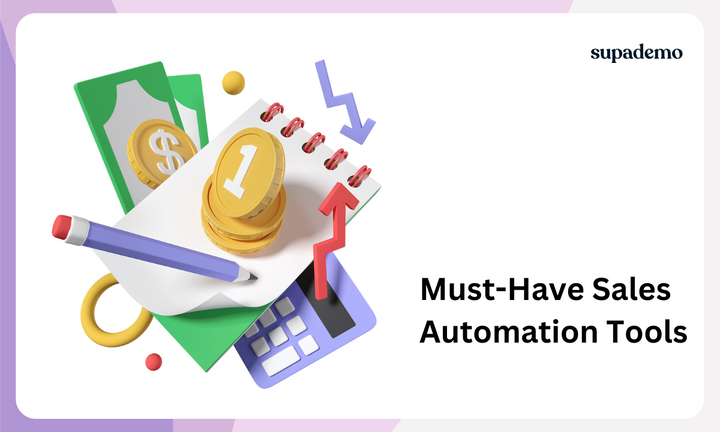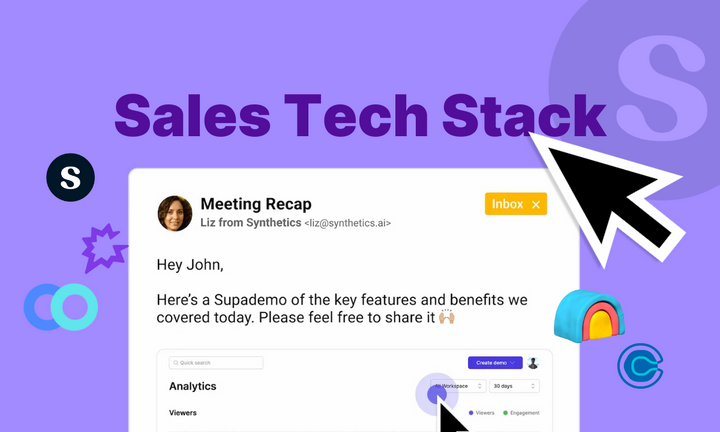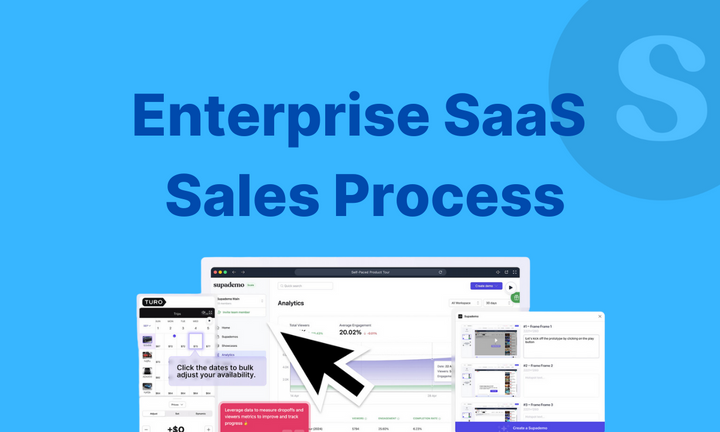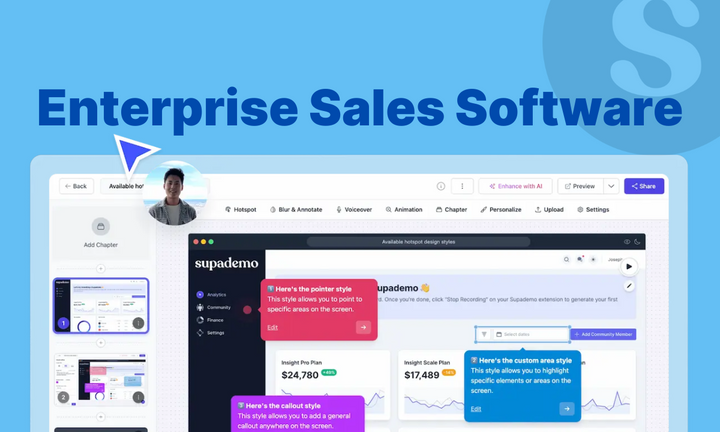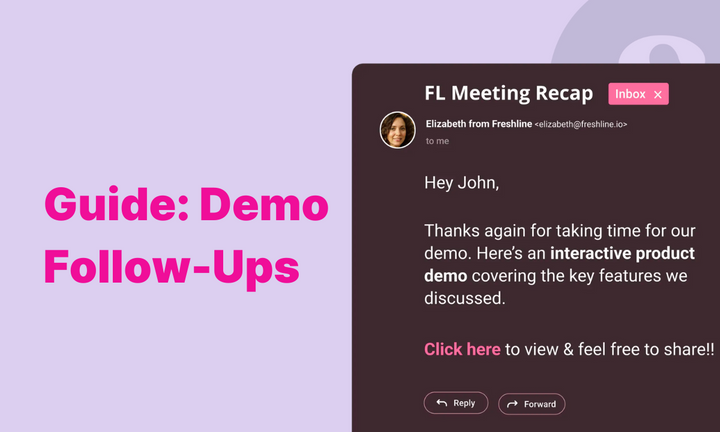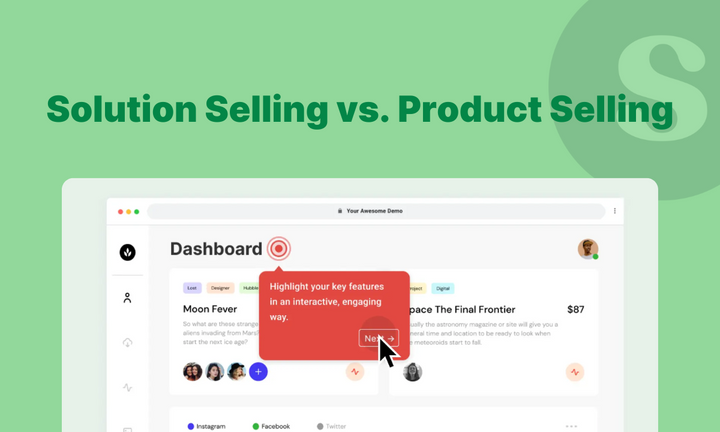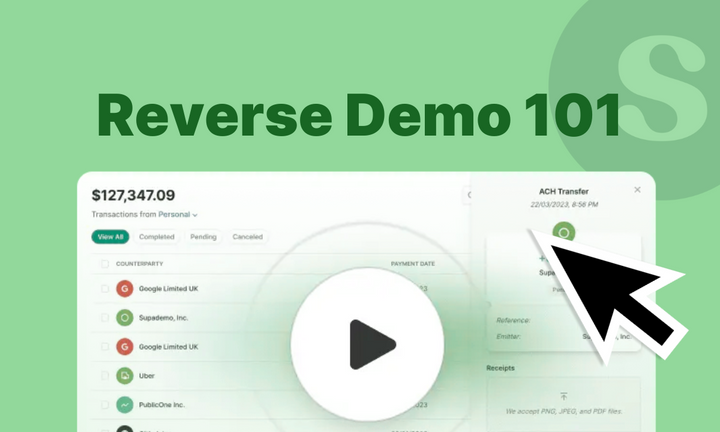Let's face it - selling isn't easy. With fierce competition and ever-changing markets, sales teams need all the help they can get.
That's where sales automation tools come in.
These powerful softwares are changing the game, letting sales pros ditch the boring stuff and focus on what really matters: connecting with customers and closing deals ✨
In this post, we will look into the top 11 sales automation tools that can supercharge your team's performance and boost your bottom line.
What are Sales Automation Tools
When you handle the sales process manually, mistakes are bound to happen. As a sales professional, you've probably experienced this firsthand. Maybe you missed out on a deal because you forgot to follow up, or perhaps you wasted valuable time trying to schedule a meeting with a potential customer.
A sales automation tool is software that simplifies and optimizes sales processes.
It handles repetitive tasks, freeing up salespeople to focus on building relationships and closing deals. These tools can manage various activities, from lead generation to performance tracking.
Sales automation tools aim to:
- Increase efficiency
- Improve lead management
- Streamline communication
- Enhance forecasting
- Provide performance insights
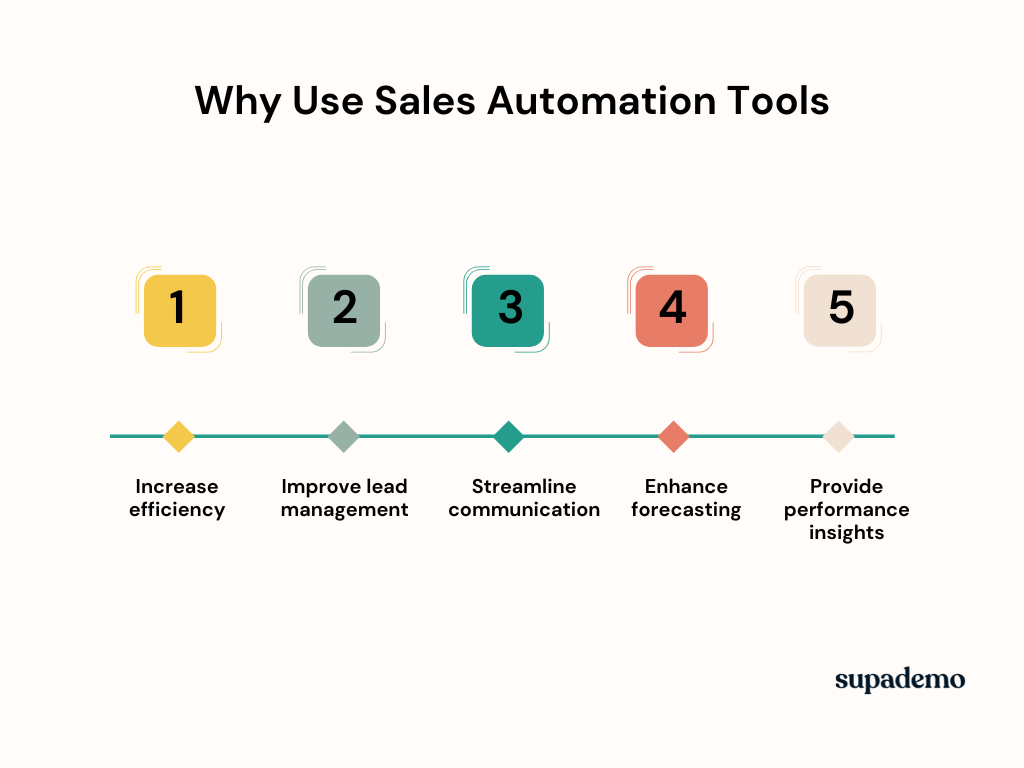
By automating routine tasks, these tools help sales teams work smarter and more productively, ultimately boosting a company's bottom line.
The Top 11 Sales Automation Tools
Now, let's dive into our curated list of the top 10 sales automation tools that can empower your sales team and drive growth:
1. HubSpot Sales Hub

HubSpot Sales Hub is a hybrid customer relationship management (CRM) and sales automation platform that offers a suite of marketing and sales tools to help small businesses drive growth.
It combines sales, marketing, and customer service functionalities into one unified platform, empowering sales teams to effectively manage leads, automate tasks, and nurture customer relationships.
Key features of HubSpot Sales Hub include:
- Contact and Lead Management: Organize and track contacts and leads in a centralized database, enabling efficient lead qualification and nurturing.
- Email Automation: Automate personalized email sequences and follow-ups to engage leads and move them through the sales pipeline.
- Sales Analytics: Gain insights into sales performance, track deal progress, and identify areas for improvement with comprehensive sales analytics and reporting.
- Sales Automation Workflows: Automate repetitive sales tasks, such as data entry, task assignment, and follow-up reminders, to save time and increase productivity.
- CRM Integration: Seamlessly integrate with popular CRMs and hundreds of other systems to ensure smooth data flow and enhance sales processes.
2. Clearbit

Clearbit is a B2B intelligence tool that provides access to rich and reliable data from millions of companies.
It empowers sales teams to sell effectively by tracking buying signals across the web, identifying high-fit leads, and seamlessly converting intent into pipeline.
Key features of Clearbit include:
- AI Native Data: Harness the intelligence of AI to streamline your datasets and enrich your lead, prospect, and customer records.
- Lead Scoring and Routing: Enable your sales team to focus their conversion efforts on the highest-quality leads.
- Buyer Intent Signaling: Easily identify target buyers and trigger an alert for your sales team when new leads are showing intent.
- B2B Contact Intelligence: Connect with key decision-makers on your accounts to convert your best opportunities with the right action at the right time.
3. Supademo

Supademo is a user-friendly, sales enablement tool to create interactive product demos in minutes.
It allows teams to easily capture and highlight key features and benefits, enabling more effective sales presentations, customer onboarding, and support processes. Supademo helps bridge the gap between product teams and customer-facing teams by providing a simple way to showcase product features and workflows.
Key features of Supademo
- No-code or design skills needed: Easily capture and annotate product workflows without coding skills.
- Interactive elements: Add clickable hotspots, tooltips, chapters, and branching paths to demos.
- Gate demos: Add email capture forms or password-protect your demos easily.
- Deep analytics and insights: Track viewer engagement and gather data on demo performance.
- Multiple sharing options: Share as links, embed anywhere, or export as GIF/video.
- CRM Integration: Seamlessly integrate with popular CRMs and other systems to ensure smooth data flow and enhance sales processes.
Practical use cases for Supademo
- Sales Enablement: Sales teams can create customized product demos for prospects, highlighting specific features relevant to each client's needs, potentially increasing conversion rates.
- Product Onboarding: Customer success teams can develop interactive walkthroughs for new users, guiding them through key product features and reducing time-to-value.
- Internal Training: Product teams can use Supademo to create training materials for customer onboarding, ensuring they're up-to-date on the latest features and can effectively communicate product value to customers and prospects.
4. 6sense

6sense revolutionizes sales automation by harnessing the power of predictive analytics and AI. It enables sales teams to identify and prioritize high-intent prospects, driving targeted and personalized outreach.
Key features of 6sense include:
- Predictive Intelligence: Utilize AI-driven predictive analytics to identify and prioritize prospects with high buying intent.
- Account-Based Marketing (ABM): Implement account-based marketing strategies with personalized messaging and content.
- Intent Data Analysis: Gain visibility into buyer intent signals and real-time engagement data for effective outreach.
- ROI Tracking: Measure the impact of sales and marketing activities with robust ROI tracking and attribution capabilities.
5. Clari

Clari is an AI-powered revenue analysis platform that provides sales teams with actionable insights and predictive analytics to improve sales execution. It leverages machine learning algorithms to analyze data from various sources and deliver real-time visibility into sales pipelines and forecasts.
Key features of Clari include:
- Sales Forecasting: Clari employs advanced analytics for precise sales predictions, aiding in recognizing risks, prioritizing prospects, and making informed decisions.
- Deal Management: This platform supports tracking and controlling opportunities during the sales process, giving an integrated view of deal activities, engagement, and stakeholders for proactive actions.
- Sales Enablement: Clari assists sales managers in providing specific guidance to their teams, offering performance insights, identifying coaching possibilities, and encouraging collaboration for better sales results.
6. Docebo

Docebo is a comprehensive learning management system (LMS) for sales training that enables extended enterprises to deliver effective training and development programs to their partner sales teams. It offers a range of features to create, manage, and track learning content, ensuring that sales professionals have the knowledge and skills they need to succeed.
Key features of Docebo include:
- Sales Content Management: Create and organize learning content, including courses, assessments, and certifications.
- Learner Engagement: Foster learner engagement through gamification, social learning, and interactive elements.
- Tracking and Reporting: Track learner progress, completion rates, and assessment results for performance evaluation.
- Industry-Specific: Docebo offers learning programs built for specific industries, such as sales development for government agencies.
- Integration Capabilities: Seamlessly integrate with existing systems, such as CRM platforms and HR software, to streamline training workflows.
- Mobile Learning: Enable sales reps to access training materials and resources on their mobile devices for flexible and on-the-go learning.
7. DocuSign

DocuSign forever changed how agreements and contracts are signed, making the process digital, secure, and efficient. It offers a cloud-based electronic signature solution that simplifies the signing and management of documents, eliminating the need for physical paperwork and manual processes.
Key features of DocuSign include:
- Electronic Signatures: Easily send, sign, and manage documents with legally binding electronic signatures.
- Workflow Automation: Streamline document workflows with automated routing, reminders, and notifications, including plenty of CRM integrations.
- Security and Compliance: Ensure document security with encryption, authentication, and audit trails to meet regulatory requirements.
8. Gong

Gong is a sales conversation analytics and revenue intelligence platform designed to help sales teams improve performance and close deals more effectively. By capturing, analyzing, and transcribing sales calls and meetings, Gong provides actionable insights and data-driven recommendations to drive revenue growth.
Key features of Gong include:
- Conversation Analytics: Gong uses AI for sales conversation analysis, transcription, and providing insights into effective tactics.
- Sales Funnel Visibility: Gong monitors deal progress and sales pipeline, offering data for better decision-making.
- Coaching and Training: Gong aids managers in coaching teams via call recordings and transcripts for targeted feedback and best practices.
9. LinkedIn Sales Navigator

LinkedIn Sales Navigator is a staple among sales professionals for more than automation. It provides sales teams with advanced search and lead generation capabilities to identify and connect with the right prospects. The downside is that Sales Navigator can be quite expensive, but the good news is there are plenty of cost-efficient alternatives on the market.
Key features of LinkedIn Sales Navigator include:
- Advanced Search Filters: Narrow down prospects based on criteria such as industry, job title, company size, and more, allowing for highly targeted lead generation.
- Lead Recommendations: Receive personalized lead recommendations based on the customer journey, connections, and engagement history, helping sales teams focus on the most relevant opportunities.
- InMail Messaging: Send direct messages to prospects even if you're not connected, enabling personalized outreach and fostering meaningful conversations.
- Sales Insights and Updates: Stay informed about key updates and activities of your prospects and existing connections, allowing you to engage at the right time with relevant information.
10. Outreach

Outreach.io is a versatile sales automation software that empowers sales teams with its comprehensive suite of tools. The platform offers powerful features such as contact management, an auto-dialer, email sequencing, A/B testing, SMS capabilities, and beyond.
Key features of Outreach include:
- Outbound Sequencing: Create and automate personalized email sequences to engage prospects effectively.
- Gmail Integration: Reps can work directly within Gmail and manage sales activities like scheduling meetings, creating tasks, and viewing prospect information, all from their Gmail inbox.
- Analytics and Reporting: Gain insights into outreach performance through detailed analytics and reporting features.
- CRM Integration: Seamlessly integrate with popular CRM platforms to ensure data synchronization.
11. Messente
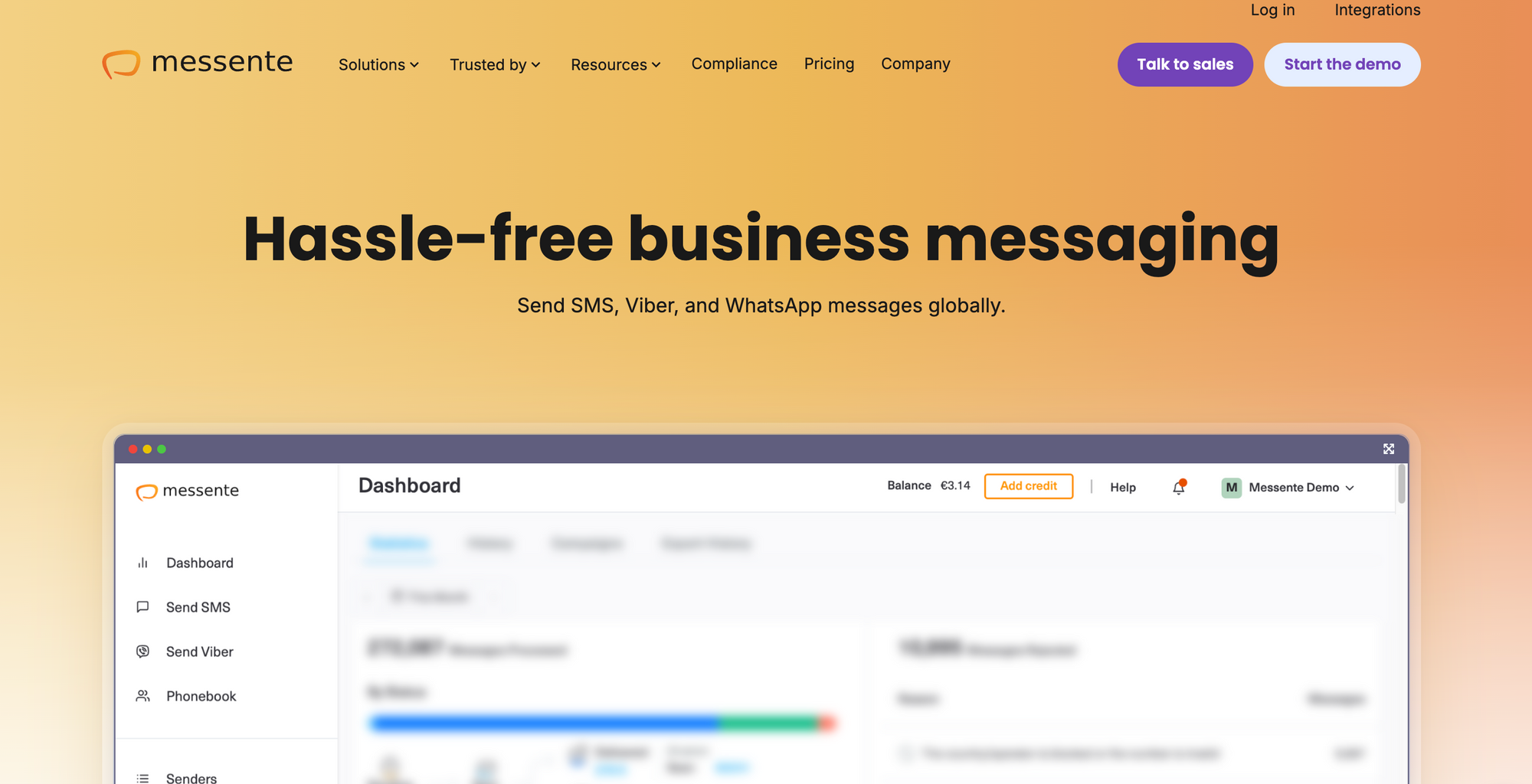
Messente is a business messaging platform that helps companies send SMS, Viber, and WhatsApp messages worldwide.
It enables sales teams to automate outreach by delivering personalized messages, following up with leads, and nurturing customer relationships at scale.
Key features of Messente include:
- Omnichannel Messaging: Send SMS, Viber, and WhatsApp messages through a single API to ensure communication reaches leads on their preferred channels.
- Automated Follow-Ups: Set up personalized SMS sequences to engage leads, remind them of appointments, or re-engage inactive prospects.
- Lead Verification: Use phone number validation to reduce failed messages and focus outreach efforts on real, reachable contacts.
- Bulk Sales Campaigns: Reach thousands of prospects instantly with promotional offers, limited-time discounts, and event invitations.
Benefits of Sales Automation Tools
Sales automation tools offer a wide range of benefits that can significantly impact sales teams' effectiveness and efficiency.

Let's explore some of the key advantages:
1. Minimizes Repetitive Tasks
One of the primary benefits of sales automation tools is their ability to minimize repetitive tasks. Sales representatives often spend a significant amount of time on manual tasks such as data entry, lead qualification, and follow-ups.
Sales automation software takes care of these routine and time-consuming tasks, allowing sales teams to focus on high-value activities like building relationships with prospects and closing deals.
2. Boosts Sales Productivity
Sales automation tools leverage artificial intelligence (AI) and data analytics to boost sales productivity. AI algorithms can analyze vast amounts of data to improve lead scoring, lead routing, and prioritization.
This, in turn, helps sales teams focus their efforts on the most promising leads, increasing the chances of conversion. Additionally, AI-powered chatbots and virtual assistants have revolutionized the sales process by automating tasks like answering commonly asked questions and automating meeting follow-ups.
3. Enhances Sales Management
Sales managers often face challenges when it comes to sales training, pipeline management, reporting, and other administrative tasks. Sales automation tools offer features that can significantly enhance sales management.
For example, AI can optimize email templates, sales scripts, and enablement materials, improving the overall sales process. AI tools can also track individual and team performance, providing real-time insights into key metrics and identifying areas for improvement.
What To Consider While Choosing Sales Automation Tools?
When selecting sales automation tools, it's crucial to consider several key factors to ensure you're getting the most bang for your buck.
Here's what to keep in mind:
1. AI-Powered Features

Look for tools that leverage artificial intelligence. AI can automate repetitive tasks, provide predictive insights, and even offer smart recommendations. This can significantly boost your team's productivity and decision-making capabilities.
2. Seamless Integration
The best tools play well with others. Seek out solutions that easily integrate with your existing tech stack, including your CRM, email platform, and other essential software. This ensures a smooth flow of data and prevents frustrating silos.
3. User-Friendly Interface
Don't underestimate the importance of ease of use. Tools should be intuitive enough that your team can hit the ground running without extensive training. A steep learning curve can negate the time-saving benefits of automation.
4. Robust Analytics
Data is king in modern sales. Opt for tools that offer comprehensive analytics and reporting features. These should provide clear insights into your sales process, team performance, and areas for improvement.
5. Quality Documentation

Even the most user-friendly tools sometimes require a bit of troubleshooting. Look for solutions that offer thorough, easily accessible documentation. This might include user guides, video tutorials, and a responsive support team.
Sales Automation Use Cases
Sales automation tools can be leveraged in various use cases to optimize sales processes and drive revenue growth.
Let's explore some common sales automation use cases:
1. Account-Based Sales and Marketing
Account-based sales and marketing (ABM) focuses on targeting specific high-value accounts with personalized strategies. Automation tools in this space help identify ideal accounts, gather intelligence, and orchestrate multi-channel campaigns.
Recommended tools for account-based sales and marketing include HubSpot, Clearbit, 6sense, and LinkedIn Sales Navigator.
2. B2B Contact Data Enrichment

There are a plethora of RevOps tools and solutions that automatically fill in gaps in your prospect data, providing comprehensive information about individuals and companies. This enriched data enables more targeted and effective outreach.
Sales automation tools like Clearbit, Cognism, and UserGems provide B2B data enrichment, enabling sales teams to access comprehensive prospecting data enriched with firmographic and technographic information.
3. Seamless Data Integration
These tools ensure that data flows smoothly between different systems, creating a unified view of customer interactions across marketing, sales, and customer service.
Recommended tools for data entry and integration include HubSpot, Clearbit, and UserGems.
4. Effortless Meeting Scheduling
These tools eliminate the back-and-forth of scheduling by allowing prospects to book time directly on a sales rep's calendar based on real-time availability.

Recommended tools for meeting scheduling include Calendly, Cal.com, HubSpot and Outreach.io.
5. Comprehensive Sales Enablement
These platforms centralize sales content, training materials, and collaboration tools, ensuring sales reps have easy access to the resources they need to close deals.
Recommended tools for sales enablement include Docebo, Clari, and Gong.
6. Demo Automation

These tools allow for the creation of interactive, self-guided product demonstrations that prospects can explore at their own pace, reducing the need for live demos in early sales stages.
Supademo is the best tool for demo automation in 2024.
7. AI-Powered Lead Scoring and Prioritization
These tools use machine learning algorithms to analyze various data points and predict which leads are most likely to convert, helping sales teams focus their efforts more effectively.
8. Sales Pipeline Management and Forecasting

Pipeline generation strategies are crucial to managing the effective sales and pipeline management to maintain an influx of prospects and leads. Sales automation provides visibility into lead progress and predicts sales performance, aiding in effective planning and adjustment of sales strategies.
Recommended tools for sales pipeline management and forecasting include HubSpot Sales Hub.
9. Sales Reports and Analytics
Analyzing sales data is essential for improving close rates. Sales automation platforms offer robust reporting and analytics capabilities to measure sales performance, identify trends, and reveal areas for improvement.
Recommended tools for sales reports and analytics include Gong, Clari, HubSpot, and Clearbit.
10. Workflow Automation
Automating workflows in the sales process enhances efficiency and productivity. Sales automation platforms enable companies to design workflows that automate lead routing, follow-up reminders, and approval processes, freeing up time for valuable activities.
Recommended tools for workflow automation include Outreach.io, LinkedIn Sales Navigator, and DocuSign.
Wrapping Up!

Choosing the right sales automation solution depends on various factors, including the size of your business, your specific needs, and your existing technology stack.
Each of these top 10 sales automation tools offer unique features, benefits and practical use cases, making them ideal for different types of startups and enterprises.
If you're looking to improve your sales enablement and demo automation with interactive demos, you may want to give Supademo a try. It's free to get started – no credit card is required.
FAQs
What is a sales automation tool?
Sales automation tools are software designed to enhance the efficiency of sales processes. They automate various tasks from prospecting and nurturing leads to closing deals.
What is the benefit of using a sales automation tool?
By using sales automation tools, your team can focus on high-priority tasks that need personal attention, as repetitive tasks are handled by the software. This results in a more streamlined sales process.


